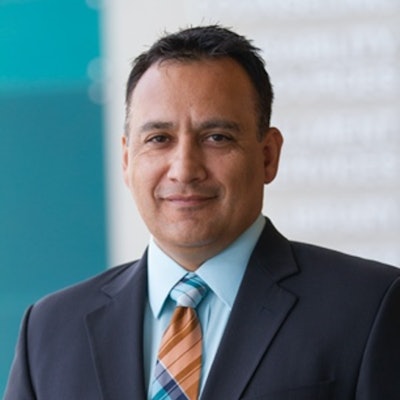Community college has proven to be an access point for underrepresented groups, with an earned reputation of affordability, accessibility and flexibility. As the number of Hispanic students enrolling in college continue to rise, priorities around increasing ethnic leadership must be addressed. In 2017, the American Council on Education, American College President Study reported 4% of College Presidents were Hispanic/Latino.
Studies have shown the importance of having a leadership team reflective of the student population to enhance the success of all students. This is particularly helpful with Hispanic students, who continue to fall behind in completion rates compared to other ethnic groups. The community college world recognizes the challenge but how do Hispanic leaders get there?
According to the Postsecondary National Policy Institute, 48% of Hispanic college students are first-generation — more than any other racial group. First-generation students often become first-generation professionals. The lack of experience and knowledge that parents or guardians can provide their child carries into the professional realm as well, leaving first-gen professionals to navigate uncharted territory alone, again.
 Natalie C. Villarreal
Natalie C. Villarreal
In 2019, Dr. Natalie C. Villarreal had the opportunity to interview community college professionals who identified as Hispanic and who are currently advancing within community college administration across the country. The research, reinforced by Dr. Steven R. Gonzalez, interim chancellor for the Maricopa Community College District, was to better understand the Hispanic community college leader. Participants shared their experiences with working in academia, offering a mix of inspiration and frustration as they try to navigate careers in higher ed.
What culminated from these rich anecdotes were recurring themes and a compass for current Hispanic leaders who are considering advancement to the President/CEO/Chancellor position in higher education.
Recurring Themes
Social Capital
The lack of social capital is a systemic barrier members of the Hispanic community face, and it was identified through the interviews as a still-present challenge for Hispanic administrators.
Understanding the societal world that we live in, and learning the unspoken rules, such as country club dress codes, societal balls, and five course meals, is necessary when working within a community. While understanding community college students is necessary, as an administrator, a large percentage of time is spent with external stakeholders in our prospective communities.
The Importance of Mentorship
All of the interview participants reported that having a mentor was critical when navigating through leadership roles in higher education. Having a leader who takes notice and opens the door for others to assume leadership positions gave these participants the motivation to apply for advanced positions on campus. Once participants were given the opportunity to learn and lead, their career trajectory intensified. Similarly, most participants had not considered a career as an administrator until a mentor or supervisor suggested the idea. Many of the participants were told early in their careers by their supervisors and mentors that they would one day be in administration, which opened their minds to a new career trajectory.
Positive and Negative Attributes of the Hispanic Culture
A theme of love and support radiated from Hispanic families through many of the interviews. Participants prioritized their families when considering an administration position. One female administrator came home and asked her teenage daughter about the idea of applying for a dean position. Several of the women spoke with their spouses about the possibility of moving to a new location for a position that prioritized the female in the household and her career trajectory. In these examples, having a closely connected family was detrimental for making these life changing decisions. The unconditional love and support of the family members gave confidence to the individuals as they were deciding to move forward with a promotion or a geographical move for a new position. However, the conversations also noted the challenges of a close-knit family, which turned into lack of mobility for some of the individuals. The priority of staying near aging parents was a recurring theme for many professionals. They commented about no longer being interested in applying for the presidency, believing they had prioritized taking care of sick or aging parents early on in their careers, when others were encouraging them to apply for higher leadership roles such as the presidency. One individual discussed moving three hours away from his mother and mother-in-law to pursue a dean position. He described the move as emotionally taxing for all family members involved. The feeling of selfishness ensued for wanting to elevate oneself at the perceived expense of the family.
These recurring themes can resonate with many Hispanic professionals who are among the first in their families to take on the professional world. The following diagram is a guide for Hispanic leaders as they navigate the unspoken rules of administration within higher education.
 Steven R. Gonzales
Steven R. Gonzales
Significant room for improvement exists to ensure that our college employees better reflect the communities we serve. Although a number of Hispanic employees can be found in various positions of the organization, the greatest opportunity for increasing representation remains in the CEO role. Applying the critical strategies outlined here provides proven techniques to overcome dismal representation at the highest levels. Still, we remain hopeful that as more Hispanic professionals enter the field, there will be increased opportunities to take on the role of President/CEO/Chancellor in the community college world.
Dr. Natalie C. Villarreal, serves as Executive Director, Government & Board Relations, Del Mar College (TX). Dr. Steven R. Gonzales, serves as Interim Chancellor for the Maricopa County Community College District (AZ).
The Roueche Center Forum is co-edited by Drs. John E. Roueche and Margaretta B. Mathis of the John E. Roueche Center for Community College Leadership, Department of Educational Leadership, College of Education, Kansas State University.
This article originally appeared in the September 30, 2021 edition of Diverse. Read it here.









